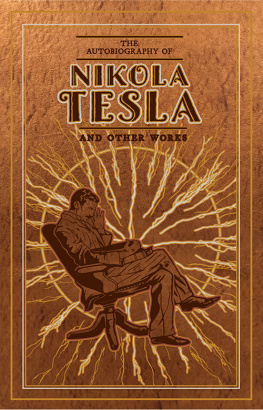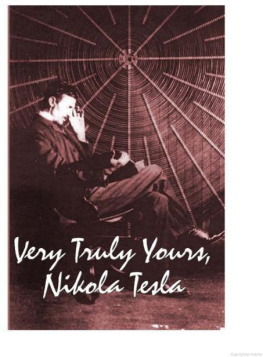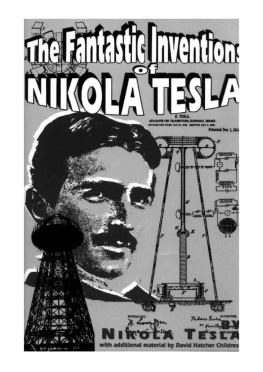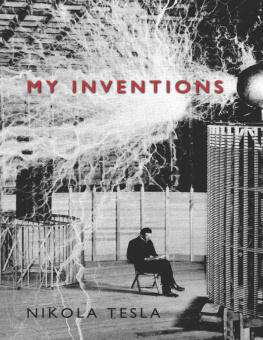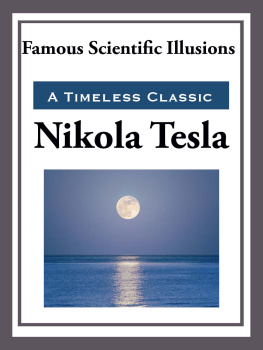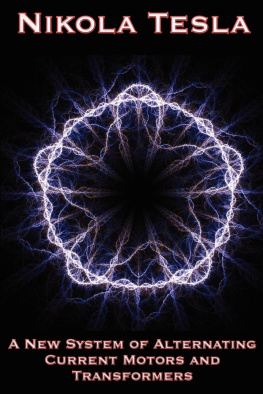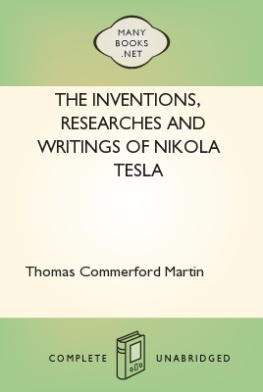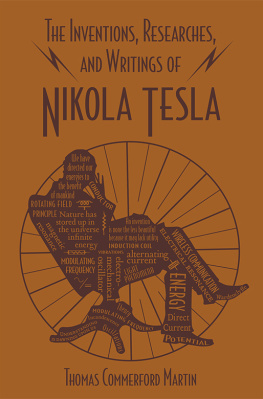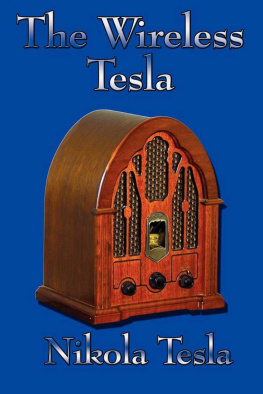The Illustrated Tesla
Start Publishing LLC
Copyright 2012 by Start Publishing LLC
All rights reserved, including the right to reproduce this book or portions thereof in any form whatsoever.
First Start Publishing eBook edition October 2012
Start Publishing is a registered trademark of Start Publishing LLC
Manufactured in the United States of America
10 9 8 7 6 5 4 3 2 1
ISBN: 978-1-62793-217-2
Introduction
Njan poetry has so distinct a charm that Goethe is said to have learned the musical tongue in which it is written rather than lose any of its native beauty. History does not record, however, any similar instance in which the Servian language, though it be that of Boskovich, expounder of the atomic theory, has been studied for the sake of the scientific secrets that might lurk therein. The vivid imagination and ready fancy of the people have been literary in their manifestation and fruit. A great Slav orator has publicly reproached his one hundred and twenty million fellows in Eastern Europe with their utter inability to invent even a mouse-trap. They were all mere barren idealists. If this were true, to equalize matters, we might perhaps barter without loss some score of ordinary American patentees for a single singer of Illyrian love-songs. But racial conditions are hardly to be offset on any terms that do not leave genius its freedom, and once in a while Nature herself rights things by producing a man whose transcendent merit compensates his nation for the very defects to which it has long been sensitive. It does not follow that such a man shall remain in a confessedly unfavorable environment. Genius is its own passport, and has always been ready to change habitats until the natural one is found. Thus it is, perchance, that while some of our artists are impelled to set up their easels in Paris or Rome, many Europeans of mark in the fields of science and research are no less apt to adopt our nationality, of free choice. They are, indeed, Americans born in exile, and seek this country instinctively as their home, needing in reality no papers of naturalization. It was thus that we welcomed Agassiz, Ericsson, and Graham Bell. In like manner Nikola Tesla, the young Servian inventor with whose work a new age in electricity is beginning, now dwells among us in New York. Mr. Teslas career not only touches the two extremes of European civilization, east and west, in a very interesting way, but suggests an inquiry into the essential likeness between poet and inventor. He comes of an old Servian family whose members for centuries have kept watch and ward along the Turkish frontier, and whose blood was freely shed that our western vanguard might gain time for its advance upon these shores. Yet, remote as such people and conditions are to us, it is with apparatus based on ideas and principles originating among them that the energy from Niagara Falls is to be widely distributed by electricity, in the various forms of light, heat, and power. This, in itself, would seem enough to confer fame, but Mr. Tesla has done, and will do, much else. Could he be tamed to habits of moderation in work, it would be difficult to set limit to the solutions he might give us, through ripening years, of many deep problems; but when a man springs from a people who have a hundred words for knife and only one for bread, it is a little unreasonable to urge him to be careful even of his own life. Thirty-six years make a brief span, but when an inventor believes that creative fertility is restricted to the term of youth, it is no wonder that night and day witness his anxious activity, as of a relentless volcano, and that ideas well up like hot lava till the crater be suddenly exhausted and hushed.
A Slav of the Slays, with racial characteristics strongly stamped in look, speech, and action, Mr. Tesla is a notable exemplification of the outcropping in unwonted form of tendencies suppressed. I have never heard him speak of a picture or a piece of music, but his numerous inventions, and the noble lectures that embody his famous investigations with currents of high frequency and high potential, betray the poetic temperament throughout. One would expect the line separating fact from theory to fade at the altitudes of thought to which his later speculations reach; but this lithe, spare mountaineer is accustomed to the thin, dry air, and neither loses sharpness of sight nor breathes painfully. Has the Servian poet become inventor, or is the inventor a poet? Mr. Tesla has been held a visionary, deceived by the flash of casual shooting stars; but the growing conviction of his professional brethren is that because he saw farthest, saw first the low lights flickering on tangible new continents of science. The perceptive and imaginative qualities of the mind are not often equally marked in the same man of genius. Overplus of imagination may argue dimness of perception; an ability to dream dreams may imply a want of skill in improving reapers. Now and then the two elements combine in the creative poet of epic and drama; occasionally they give us the prolific inventor like Tesla.
Jules Breton has spoken of the history of his life as being at the same time the genesis of his art. This is true of Nikola Teslas evolution. His bent toward invention we may surely trace to his mother, who, as the wife of an eloquent clergyman in the Greek Church, made looms and churns for a pastoral household while her husband preached. Teslas electrical work started when, as a boy in the Polytechnic School at Gratz, he first saw a direct-current Gramme machine, and was told that the commutator was a vital and necessary feature in all such apparatus. His intuitive judgment or latent spirit of invention at once challenged the statement of his instructor, and that moment began the process of reasoning and experiment which led him to his discovery of the rotating magnetic field, and to the practical polyphase motors, in which the commutator and brushes, fruitful and endless source of trouble, are absolutely done away with. These perfected inventions did not come at once; they never do. The conditions that surrounded this youth in the airy fastnesses of the Dinaric Alps all made against the hopes he nursed of becoming an electrician ; and not the least impediment was the fond wish of his parents at Siniljan Lika that he should maintain the priestly tradition, and benefit by the preferment likely to come through his uncle, now Metropolitan in Bosnia. But Tesla felt himself destined to serve at other altars than those of his ancient faith, with other means of approach to the invisible and unknown. He persevered in mathematical and mechanical studies, mastered incidentally half a dozen languages, and at last became an assistant in the Government Telegraph Engineering Department at BudaPest. His salary was small enough to please those who hold that the best endowment of genius is poverty, and he would make no appeals to his widowed mother for help. Experimenting, of course, went on all the time at this juncture it was on telephony that he wasted his meager substance in riotous invention. Desirous of going to a fete with some friends, and anxious not to spend on clothes the money that might buy magnets and batteries, the brilliant idea occurred to him to turn his only pair of trousers inside out and to disport in them on the morrow as new. He sat up all night tailoring, but the fete came and went before he could reappear in public. This episode is quite in keeping with his boyish efforts to fly from the steep roof of the house at Smiljan, using an old umbrella as arostat; or with the peculiar tests, stopped by the family doctor before the results could be determined, as to how long he could suspend the beating of his heart by will power.
Naturally enough for a young inventor seeking larger opportunity, Tesla soon drifted west- ward from Budapest. He made his way to Paris, where he quickly secured employment in electric lighting, then a new art, and encountered an observant associate of Mr. Edison. Almost before he knew it, he was on his glad voyage across the Atlantic to work in one of the Edison shops, and to enter upon a new stage of development. He had profound faith in the value of the principles first meditated in the silence of the sterile mountains that border the Adriatic, and he knew that in a country where every new invention in electricity has its chance, his turn would come also, for he now had demonstrated his theories in actual apparatus.


